There are pros and cons to raising any animal, ducks included. But, from my many years of personal experience, the pros far outweigh the cons when it comes to duck keeping.
Ducks, like chickens, can be kept not only on spacious rural homesteads, but in suburban or urban areas as well. A small flock of ducks with nothing more than a clean plastic baby pool can be happy just about anywhere.
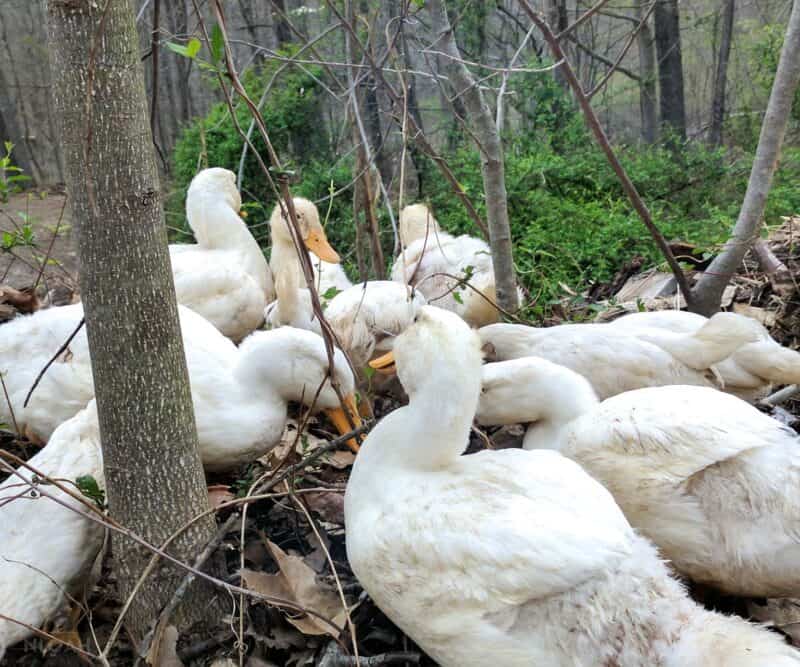
Getting ducks is a decision that should be weighed carefully, but if you want to know the good and bad of raising these adorable animals, you can find them below.
Duck Raising Pros and Cons at a Glance
| Pros | Cons |
|---|---|
| ✅ Fairly cheap to raise | ❌ Messier than chickens |
| ✅ Multiple males won’t create problems | ❌ Duck pond can freeze in the winter |
| ✅ Quieter than chickens | ❌ Laying eggs in random places |
| ✅ Easy to add new ducks to flock | ❌ Duck pond maintenance means extra work |
| ✅ Good egg layers | ❌ More prone to predators than chickens |
| ✅ Drakes live longer than roosters | ❌ They need more space |
| ✅ Easier to free-range than chickens | ❌ Harder to incubate duck eggs than chicken eggs |
| ✅ They do better pest control than chickens | ❌ Drakes mate more frequently than chickens |
| ✅ Less garden destructions (compared to chickens) | ❌ Lousy egg sitters |
| ✅ Droppings are great fertilizer | ❌ Need more protein and niacin than chickens |
| ✅ Feathers can be used in pillows | ❌ You can’t keep fish in the pond that they use |
| ✅ Drakes are less aggressive than rooster | ❌ Drakes more aggressive during mating season |
| ✅ Good immune systems | ❌ Incubating duck eggs harder than chicken eggs |
| ✅ Easier to sex than chickens | ❌ While duck meat tastes great to some, it may not be for others |
| ✅ They have interesting personalities | |
| ✅ Smarter than chickens | |
| ✅ Meat tastes great | |
| ✅ Drakes live longer than roosters |
Duck Raising Pros
Cost
Raising ducks is not expensive and they are possibly the least expensive type of livestock to raise. Given the opportunity to free-range, domestic ducks of all breeds will scour the available landscape for bugs, tadpoles, and greens.
A duck that free ranges just a few hours a day can fulfill at least half of its dietary needs year-round, keeping feed costs down.
Multiple Males Won’t Create Problems
A drake (mature male duck) will not become aggressive or attack like a rooster – mature chicken. Keeping multiple drakes at one time will not cause violent bird-on-bird attacks, as is often the case with roosters.
As long as you keep the recommended three hens to one drake ratio in the flock, having multiple males will not result in fussing between them.
Noise Level
The noise level of ducks can be a hotly debated topic. While they will clatter when you are a mere few minutes late for feeding time, turn out or put up, or snack time, they will not be crowing loudly like a rooster at dawn or throughout the day.
Female ducks tend to carry on more than male ducks, but only when demanding you show up with sustenance or while keeping their little ducklings in line.
New Additions Work Smooth
The “pecking order” with ducks is nearly non-existent and far more friendly of an experience when compared to that of chickens or turkeys.
Ducks are an amicable type of poultry bird, and always seem to possess a “the more the merrier” style of disposition, instead of a prickly hierarchy that causes fussing and even injuries when new birds are added to the flock.
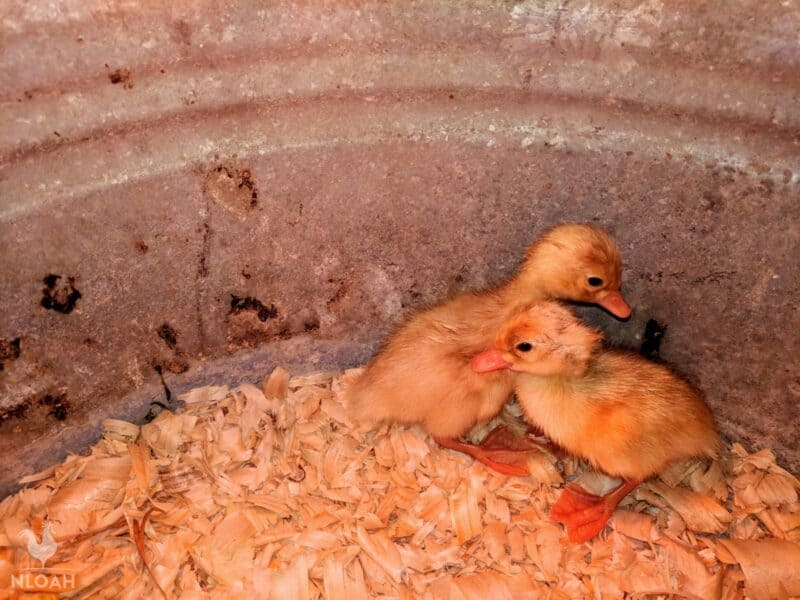
They are Good Egg Layers
On average, ducks lay far more eggs than chickens on an annual basis. Duck eggs are significantly larger than chicken eggs, as well.
Eggs from duck hens can be a bit of an acquired taste when eaten scrambled or over easy, but when used for baking or cooking, the recipe will come out a lot creamier, lighter, and fluffier.
Ducks are prone to laying eggs consistently until they are six to nine years old, instead of for only two or three years for commonly kept chicken breeds.
Breeder Longevity
On average, drakes live longer than roosters. Not only will the longevity of drakes keep bird replacement costs down, you won’t have to spend time teaching a new bird to learn your keeping habits.
They are Cute And Fun!
It would be virtually impossible to overestimate how much fun baby ducklings and their more mature fellow flock members are to watch. My family and I have spent copious amounts of hours laughing at their antics and taking photos of the adorable little yellow fuzz balls as they hatch.
Intelligence And Free-Range Training
Teaching a duck flock to free-range, and the overall barnyard routine has been both quicker and easier than teaching the same skills to chickens – in my personal experience.
No matter the breed, ducklings to new mature ducks added to my flocks over the years seamlessly meld into the daily routine with far fewer trying moments than any breed of chicken I have ever owned.
Foraging Success
Ducks not only tend to eat more pesky bugs than chickens, but they can also eat far larger ones. Mature ducks are capable of eating thick slugs and nearly any insect up to 8 inches long that is invading your yard or garden.
Garden – Landscaping Destruction
Ducks will poke their bills into any and every mud hole they can find but will not dig copious amounts of holes in your garden or decorative landscaping like chickens do with their pointy beaks.
Drakes aren’t as Aggressive as Roosters
Drakes aren’t as aggressive as roosters, which means they’re much nicer to humans than roosters. They’re also quieter than chickens but they’re also notorious ladies’ men.
Delicious Meat
Duck meat is just delish! It can be cooked in a number of different ways which allows for a variety of meals.
Feathers for Pillows
Ducks grow very fine, soft feathers that keep them warm in winter. If you like to make your own pillows or crafts; then you’ll love getting some of these downy feathers.
Fertilizer
Duck droppings are great fertilizer and can be added to your compost and flowerbeds.
Escape Artists? Nope.
Domestic ducks can’t fly very well and aren’t as skittish as chickens and so they don’t take flight like them.
Very Few Health Issues
Ducks have very strong immune systems and are less prone to the common diseases that affect other birds like chickens.
Easy to Sex
Sexing ducks is very, very easy – most of the time. Male ducks will sometimes develop colorful, curled feathers. Their voices are also different, males are much quieter than females.
They are very Clever
Ducks are very intelligent and can learn routines with ease, and they remember and stick to the routines they learn.
Cons of Raising Ducks
They Can be… A Little Messy
Both ducks and ducklings are messy. They play in their water bowls and will even try to sit inside of them no matter how the containers are or how nice and clean or large their pond or baby pool is. Using closed-top waterers with a drinking fountain cannot be highly recommended enough to prevent needless extra cleaning.
The wet webbed feet of ducks after they get out of their water source will create and track mud EVERYWHERE inside of the coop and run. Bedding changes need to be conducted a lot more frequently than when keeping chickens or other poultry birds.
Ducklings dropping are also larger and runnier than the droppings created by other poultry birds.
Keeping the run, coop, nesting boxes, and bedding both clean and dry to maintain healthy and sanitary living and laying conditions is definitely more time-consuming when keeping ducks.
Duck Ponds Freeze Up In The Winter
Even during the winter months, the members of the duck flock will still need access to a pond or duck pool to swim in.
Filling 1-gallon milk jugs with a 2 to 1 mixture of common table salt and tap water can help prevent a solid layer of ice from forming on a pond. Small plastic bottles can be used to keep a garden pond or baby pool from freezing solid.
The salt water-filled jugs can be allowed to float around the pool, but when dealing with a large pond where frequent movement around the jug area is an issue, I recommend typing the jugs to ropes that are loosely strung across the pond so they are moved in place by the wind – or even the ducks themselves.
This trick works quite well until the temperature dips into the teens. During times like these, expect to increase the level of salt slightly as well as add more bottles with fresh hot water into the water source used by the ducks.
Ducks will poke through a thin layer of ice with their feet but do not possess the capability to poke through thick or solid ice.
If the pond is also used by other barnyard livestock to water, the larger animals will help keep the shallow areas free from ice with their routine drinking – breaking the ice up with their hooves as necessary as it starts to harden.
Take a look at our other article on this topic and find even more ways to keep water from freezing.
It Is Difficult To Keep Fish In The Same Pond
Ducks WILL eat fish, they quite enjoy them as a favorite meal. A mature duck is capable of eating a creature up to 8 inches long.
If you want to add fish to the pond that is not intended as a food source for the ducks, it would be wise to raise them to maturity in a separate pool or pond, first. But, just because a duck cannot eat a 9-inch-long Koi fish doesn’t mean the cute little bird will not try.
If you want to keep a fish in a small decorative garden pond or stock a large pond with fish to catch for dinner, problems will arise. Mature bass or other popular pond stock fish will not be consumed by ducks, but their eggs and young surely will.
Duck Ponds Can Be A Lot Of Work To Keep Clean
The ducks will often lounge just outside of their pond or water source to preen themselves after swimming. Expect to see copious amounts of feathers scattered about on a daily basis just outside of the pond or duck pool.
There are several ways to help prevent tracking from wet or muddy duck feet into the coop and causing bedding to become prematurely soaked and dirty. You can layer rounded gravel around the area to allow the water and mud to filter through the gravel without harming the ducks’ feet.
Pavel stones or mulch can also help clean up the soggy feet and underbellies of ducks safely. Mulch will need replacing throughout the year, but if you heat with firewood, making your own mulch with the leavings from split wood is still an economical duck-keeping endeavor.
Mating Frenzy
Drakes are amorous creatures. While they prefer to mate on water or in the rain, a drake will spend far more time than a rooster chasing the ladies, on average.
If you want to keep expanding your flock or breed ducks to sale, this will play in your favor, but if you have only a limited amount of space, the constant supply of fresh ducklings could become problematic.
Egg Dropping
Although this can vary by breed, ducks have a far greater tendency to drop their eggs wherever they happen to be at the moment, instead of in nesting boxes as chicken hens.
If your ducks are free-ranging, odds are eggs can end up just about anywhere. It is not at all unusual to find eggs scattered about the coop and run – often getting trampled instead of ending up on your plate.
They Are Lousy Egg Sitters
While some duck breeds are really good sitters as well as layers, many breeds are not. Pekins, for example, are excellent layers, but lousy sitters.
Although duck hens do not become broody like chicken hens, they are less likely (on average) to naturally hatch their own offspring. If you want the best chance at hatching ducklings, an incubator will likely be necessary.
They’re More Vulnerable To Predators
Ducks have no natural defenses against even small common predators – hence the phrase, “sitting ducks.”
A good rooster will diligently watch over its flock, but the best of drakes will often remain blissfully unaware of a looming threat, focused more keenly instead on mating or swimming.
Duck Taste May Not Be To Your Liking
If you are planning on raising ducks as meat and egg poultry birds, it is recommended to have everyone in the family taste both duck meat and eggs prepared alone and in a dish first.
The meat and eggs from ducks can be deemed delicious by some, but others will turn their noses up at duck-based meals and refuse to eat them.
Switching from chicken eggs to duck eggs for the first time while making homemade noodles for Thanksgiving could lead to an epic culinary disaster.
Not only will some members of your holiday gathering likely not care for the new taste or even the new smell of your signature homemade noodles, you have to carefully convert a recipe to adapt to the larger duck eggs or the dish will turn out runny.
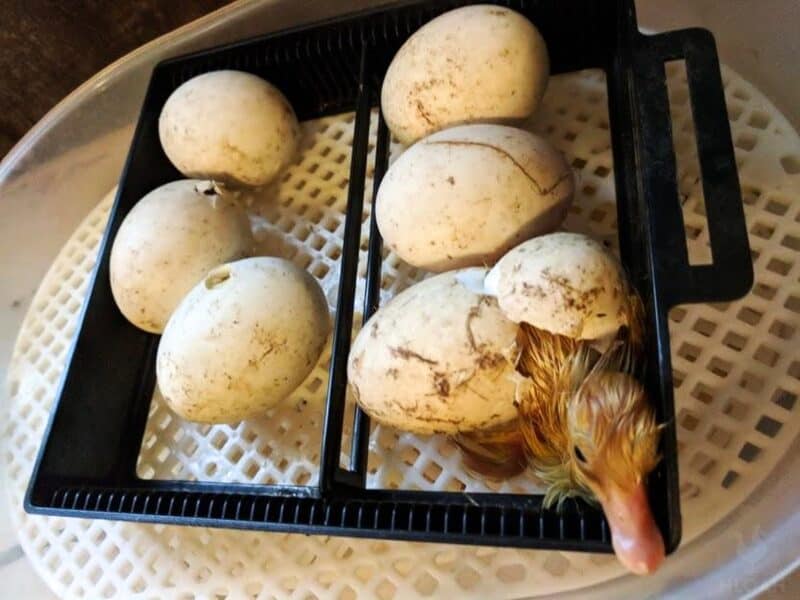
Different Dietary Requirements
Ducks have a very different diet from chickens, they require more protein and niacin than chickens. Something to keep in mind is that they should have any medicated feed.
They Hide Their Eggs
If you’re raising ducks for eggs, you may find yourself getting annoyed when it’s time to start collecting. This is because ducks typically lay their eggs wherever they like so you never know where you’re going to find them.
Males Can Get Aggressive During Mating Season
While drakes aren’t as aggressive as roosters, they can get quite aggressive with females during mating season. Keeping a balanced ratio of one male to five females.
They Need More Space
Ducks need more space than chickens as they prefer to nest on the ground and their enclosures/coops require some protection from both predators and the cold.
Incubation May Be Trickier
Incubating duck eggs is decidedly more difficult than incubating chicken eggs. Duck eggs are highly susceptible to even the most slight change in humidity.
It is not uncommon to have only a 50% success rate the first few times a newbie keeper incubates duck eggs. Even after becoming more familiar with the duck egg incubation process, a seasoned keeper might still enjoy only a 70% success rate.
Classifying the rapid growth rate of ducklings into either a pro or a con was not possible. While the rapid growth of ducks (regardless of breed) can be viewed as plus by some keepers, others deem it a con.
The brooder used for ducklings will need to be more spacious than one used for chicks – and cleaned far more frequently.
These big eaters and heavy drinkers need ample space to move about, yet still need protection from the elements just as young chicks do – so no taking them out of the brooder and out into the cold too early simply because of their size.
The quick growth rate of ducklings will tend to help them be hardier at a younger age, and if hatched during a warm time of the year, they can actually be taken out of the brooder early – but only if night temperatures do not dip too low.
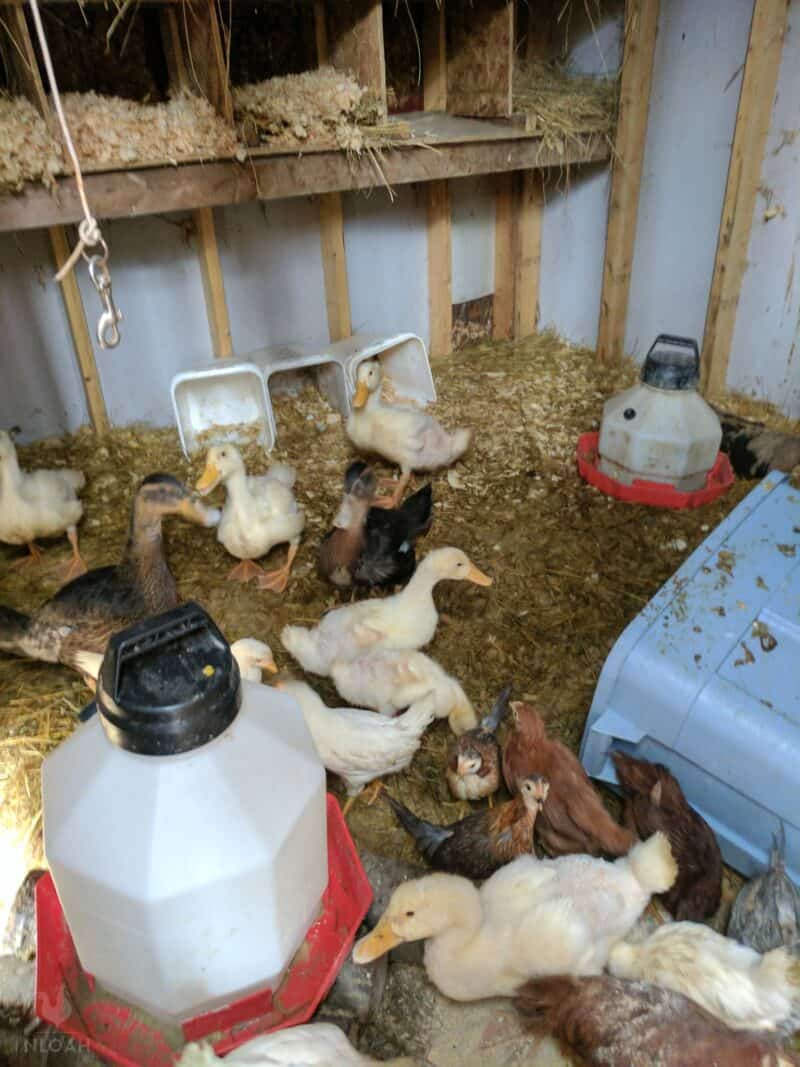
Raising Ducks And Chickens In The Same Coop
Once the ducklings are placed into the coop with the rest of the flock, they are less likely to get squished than chicks of the same age. We raise our ducklings and chicks together in the same brooder, allowing them to imprint on each other from day one and making the flock transition more seamless.
While ducks would prefer more room to roam than many chickens breeds, they can be kept in a small backyard coop and run just like the more traditional poultry birds – as long as they have a water source constantly available for swimming and dipping their heads and bills into during periods of extreme cold.
The only con associated with keeping ducks in a small outdoor space relates to the number of these adorable egg producers you can keep. Because of their larger size, fewer ducks can be housed in a small coop than chickens.
Thankfully for small space keepers, ducks prefer to be outside even during times of cold or inclement weather – unlike chickens.
This helps keep the cost of coop building down. Expanding a run or free-ranging to accommodate ducks is a lot less expensive than building onto an existing coop or erecting a new one altogether.
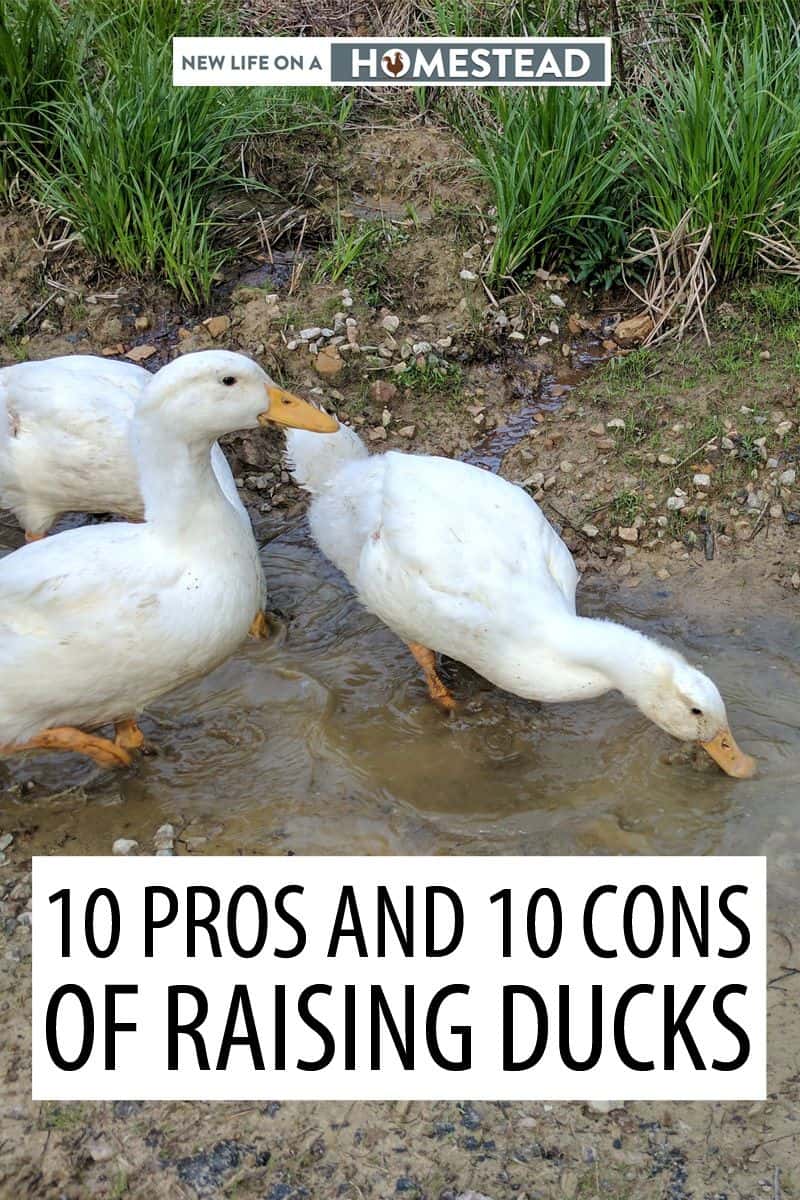

Tara lives on a 56 acres farm in the Appalachian Mountains, where she faces homesteading and farming challenges every single day, raising chickens, goats, horses, and tons of vegetables. She’s an expert in all sorts of homesteading skills such as hide tanning, doll making, tree tapping, and many more.

Great article!!!!! As a child we had ducks and geese, i always want to have ducks, i have chicken and goats. I was thinking putting ducks with the goats, what is you opinion on that?. i cant have them free range due to having water gardens, small 125 gallon pond with gold fish and above ground pool.
Great article and reality check! I’ve never raised livestock but I’m considering ducks and rabbits. This article is very helpful. Thank you!
Do you recommend a specific waterer for ducks?